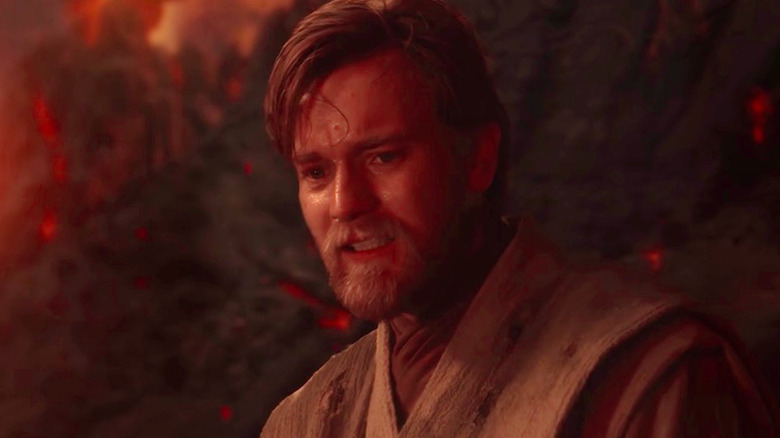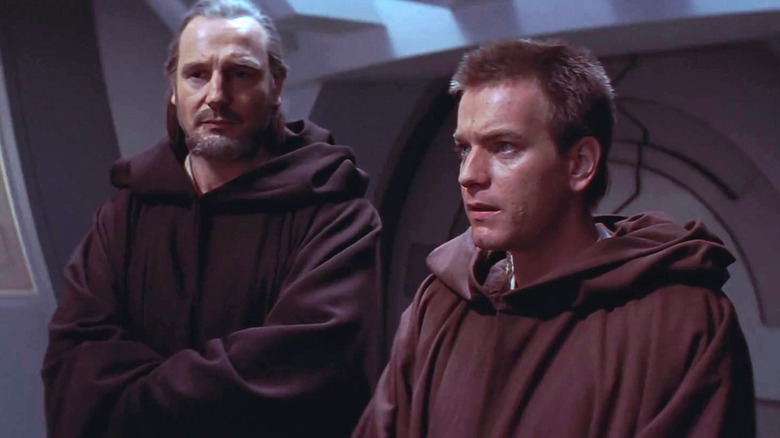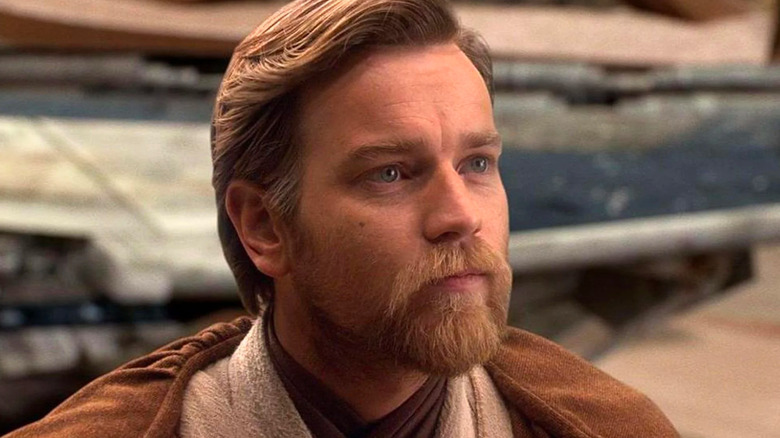Why Ewan McGregor Wasn't Satisfied Acting In The Star Wars Prequels
Ewan McGregor remembers exactly where he was, and what he was doing, when he won the role of Obi-Wan Kenobi in the "Star Wars" prequels. It was in the midst of filming "The Velvet Goldmine," a glam rock musical that also starred Christian Bale and Jonathan Rhys Meyers. "I was getting craft services with Christian when I got the call," McGregor told The Hollywood Reporter. Though he'd initially been discouraged from the project, the actor was sure it'd be his biggest break yet. "I always wanted to be a worthy actor, [but] at the same time, there was a part of me that wanted to be a rock star."
"Episode I: The Phantom Menace" was McGregor's first outing as the Jedi Master previously embodied by the legendary Alec Guinness. "Star Wars" would undoubtedly propel him to new levels of recognition, but not all press was good press for the prequels. They might be graciously considered camp now — thanks to the younger generation of fans that grew up with the film — but episodes I through III were woefully ridiculed in the early 2000's.
McGregor may have disliked filming the prequels almost as much as fans did watching them, and he cites the film's over-reliance on CGI as part of the problem.
Complicated Effects Created Compromise Elsewhere
George Lucas and his contemporaries at Lucasfilm are well-known for their innovation. Just as the original "Star Wars" trilogy reinvented standards for visual effects and sound, so too did Lucas' second trilogy. The prequels were very much a playground for the director to push the limits of CGI. While those advancements changed the way films are made to this day, it wasn't easy for the actors to adapt to such sparse environments.
"The Phantom Menace" managed to balance the use of practical and visual effects, but Lucas became increasingly reliant on CGI with his second and third films. Entire sets became blue and green screens, leaving actors more or less reliant on their own imaginations. McGregor reflected on the frustrating experience with THR:
After three or four months of that, it just gets really tedious — especially when the scenes are ... I don't want to be rude, but it's not Shakespeare... There's not something to dig into in the dialogue that can satisfy you when there's no environment there. It was quite hard to do.
The actor was not the only one to face difficulty with the mounting use of CGI. Liam Neeson, who portrayed Obi-Wan's master Qui-Gon Jinn in "Phantom Menace," named the prequel his first and final foray into the sci-fi genre on that alone. "I was acting to tennis balls," Neeson told Entertainment Tonight in 2020. "That was interesting, acting-wise, to try and make that seem real, but that was the last. It's quite exhausting."
Kenobi Got the High Ground ... Eventually
Fortunately, technology at Lucasfilm has evolved again, eliminating the need for green screens altogether. StageCraft, a technology developed for Disney+ series "The Mandalorian," immerses cast into a computer-generated environment called The Volume. By projecting photo-real environments onto massive LED screens, both cast and crew are on the same page about the world they're creating. "Mandalorian" showrunner Jon Favreau spearheaded the development of StageCraft in past Disney projects like "The Jungle Book."
This same technology will be also used in "Obi-Wan Kenobi," the highly-anticipated limited series that will see McGregor return to play the exiled Jedi. Production on the series has already begun, and though details are under lock and key as always, McGregor has expressed his outspoken excitement for it: "It's going to feel so much more real."
It's a relief to know that, even with such a tricky on-set experience, McGregor is still so passionate about reprising his "Star Wars" role. "For all my moaning about green screen, I did enjoy playing Obi-Wan," he told Vanity Fair in 2019. And now that the prequels' intended audience has finally brought the merits of the trilogy to the fore, all stars seem to be aligned for Obi-Wan Kenobi's second (or third, if you count Alec Guinness) act.


